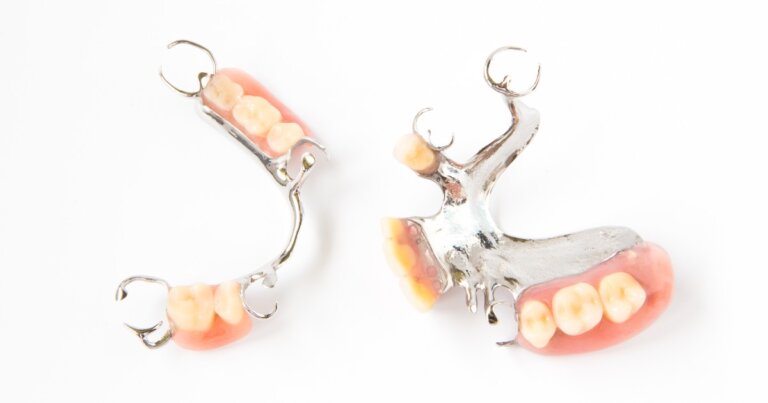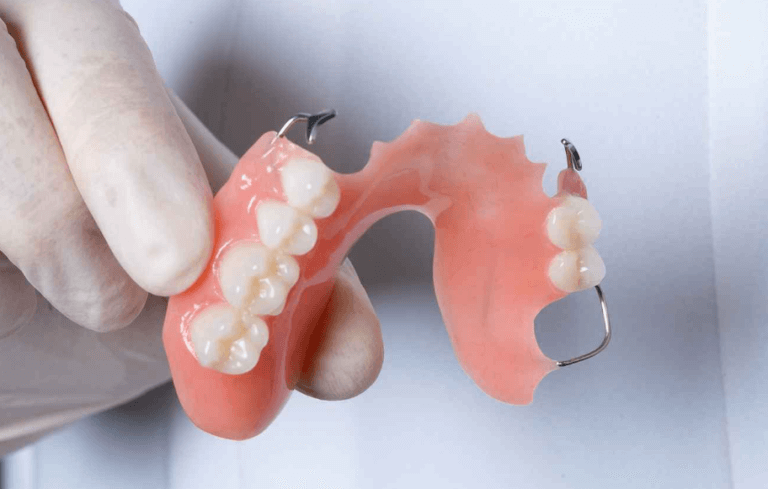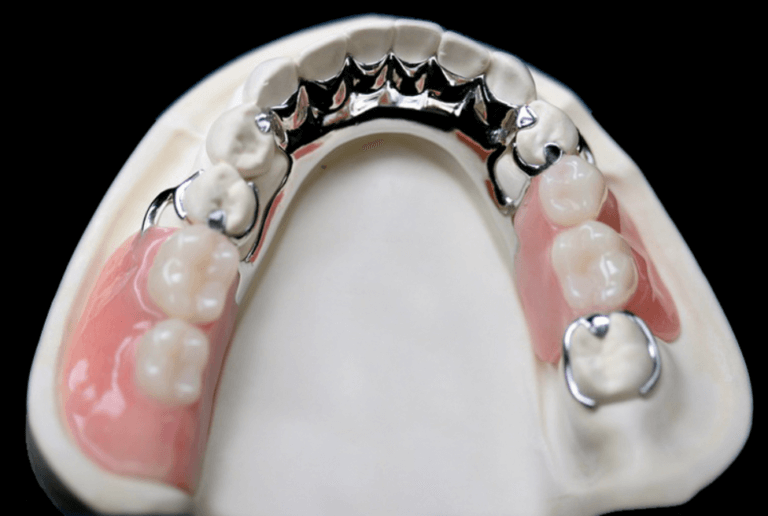Partial Denture

What Is A Partial Denture?
A Partial Denture is a removable dental appliance designed to replace one or more missing teeth in the upper or lower jaw. Unlike full dentures, which replace an entire arch of teeth, partial dentures work seamlessly with your remaining natural teeth. These prosthetics are custom-made for a comfortable fit and a natural look, offering an excellent option for those who want to avoid invasive treatments like dental implants or fixed bridges.
Before deciding on whether a Partial Denture are right for you, there are some things you should know:
- Who Needs A Partial Denture?
- Types Of A Partial Denture
- Benefits Of A Partial Denture
- Alternative Treatments To Partial Dentures
- How Much Does A Partial Denture Cost?
- Steps In The Partial Denture Procedure
- How Long Does A Partial Denture Last?
- Frequently Asked Questions About Partial Dentures
If you have any further questions about A Partial Denture or other dental services offered at Atlas Dental, please contact us.

Free Phone Consultation
Have questions about cosmetic dentures for missing teeth? Book a free phone consult with our Toronto dentist

5 star google reviews
Our patients love their cosmetic looking denture smile! See for yourself why patients choose Atlas Dental.

Book a denture appointment online
We make custom fitted dentures to help our patients smile confidently again.
Who Needs A Partial Denture?
Partial dentures are suitable for individuals facing tooth loss due to various reasons:
- Missing Teeth: Restore your ability to chew, speak, and smile confidently.
- Preserve Natural Teeth: Prevent adjacent teeth from shifting into the gaps left by missing teeth.
- Cost-Effective Option: Offers an affordable alternative to implants or bridges.
- Temporary Tooth Replacement: Serves as a transitional solution during ongoing dental treatments.
- Medical Limitations: Ideal for individuals unable to undergo implant surgery due to bone density or health issues.
It’s essential to consult with a qualified dentist or prosthodontist to determine if a partial denture is the right choice for your specific dental needs. If you have further questions about Partial Dentures, please contact us.

Types Of Partial Dentures
There are several types of partial dentures available, each designed to meet specific dental needs and preferences:
- Acrylic Partial Dentures: These are made with a pink acrylic base that resembles gum tissue, supporting artificial teeth. While they are affordable and easy to adjust, they are often bulkier and less durable compared to other options.
- Cast Metal Partial Dentures: These feature a sturdy metal framework, often made from cobalt-chromium, for added durability and a more precise fit. They are lightweight, long-lasting, and less bulky than acrylic options.
- Valplast Dentures: These flexible dentures are made from a nylon-like material that blends naturally with the gums. They are comfortable, lightweight, and free of metal clasps, offering a more aesthetic and hypoallergenic option.
- Essix Dentures: These are clear, removable dentures made from thin plastic that fits snugly over your existing teeth. Essix dentures are typically used as a temporary solution for missing teeth.
- Single Tooth Partial Dentures (Flippers): Designed to replace just one missing tooth, these lightweight and cost-effective dentures are often used as a temporary option.
Each type of partial denture has unique benefits and is suited for specific cases. Your dentist will help determine which option is best based on your oral health needs, preferences, and budget. If you have further questions about Partial Dentures, please contact us.
Benefits Of A Partial Denture
Here are some of the key advantages of opting for a partial denture:
- Restored Functionality: Improves chewing and speech.
- Enhanced Aesthetics: Blends seamlessly with natural teeth for a confident smile.
- Prevent Teeth Shifting: Maintains alignment by filling gaps.
- Affordable Solution: Costs less than implants or bridges.
- Non-Invasive: No surgery required; quick fabrication process.
- Customizable Fit: Tailored to meet individual needs and preferences.
Some individuals may benefit more from other tooth replacement options, such as dental implants or fixed bridges. It is essential to consult with a qualified dentist who can assess your oral health, discuss your goals, and recommend the most suitable treatment plan for your specific case. If you have further questions about Partial Dentures, please contact us.
What Are The Alternative Treatments If I Do Not Choose A Partial Denture?
If a partial denture isn’t right for you, consider these options:
- Dental Implants: Permanent, natural-looking replacement for individual teeth.
- Fixed Bridges: Non-removable restorations anchored to adjacent teeth.
Each alternative treatment has its own set of advantages and considerations, so it is crucial to discuss your specific dental needs and preferences with your dentist. They will evaluate your oral health, explain the pros and cons of each option, and help you make an informed decision that aligns with your goals and budget. If you have further questions about Partial Dentures, please contact us.
Cost of Partial Dentures
Partial Dentures can range in cost from $474 to 1454 plus dental lab fee, depending on the type of partial denture. Example of denture codes found in the Ontario Dental Association’s Suggested Fee Guide appear as follows:
Dentures, Partial, Acrylic Base (Provisional). (e.g. Single Tooth Dentures, Essix Dentures)
- 52101 – Maxillary: $474 + Dental Lab Fee
- 52102 – Mandibular: $474 + Dental Lab Fee
Dentures, Partial, Polymer, Resilient Retainer. (e.g. Valplast Flexible Partial Dentures)
- 52201 – Maxillary: $695 + Dental Lab Fee
- 52202 – Mandibular: $695 + Dental Lab Fee
Dentures, Partial, Acrylic, With Metal Wrought/Cast Clasps and/or Rests. (e.g. Acrylic Partial Dentures)
- 52301 – Maxillary: $794 + Dental Lab Fee
- 52302 – Mandibular: $794 + Dental Lab Fee
Dentures, Partial, Cast Metal Frame/Connector, Clasps and Rests. (e.g. Cast partial Dentures)
- 53101 – Maxillary: $1454 + Dental Lab Fee
- 53102 – Mandibular: $1454 + Dental Lab Fee
Partial Dentures are sometimes considered a supplementary service by dental insurance plans and may or may not be covered by your dental insurance. Be sure to find out from your dental insurance plan provider how much you are eligible for before going ahead with dental treatment. Your dentist can help you submit an predetermination to your dental insurance. Our fees are consistent with the ODA Fee Guide.
For patients without dental insurance, Atlas Dental is pleased to offer dental financing through iFinance Dentalcard. Affordable payment plans start at 7.95% for terms of 6 months to 6 years. To learn more about Dentalcard dental treatment financing, follow this link.
Steps In The Partial Denture Procedure
Let’s walk through the typical procedure for getting a partial denture:
- Consultation and Assessment: Your dentist evaluates your oral health and discusses your treatment goals.
- Impressions: Custom molds of your teeth and gums are taken to ensure a perfect fit.
- Fabrication: The denture is crafted in a dental lab to match your natural teeth.
- Fitting and Adjustments: The denture is tried on, and any necessary adjustments are made for comfort and functionality.
- Final Placement: The finished denture is placed, and instructions on care and maintenance are provided.
By following these steps and working closely with your dental professional, you can achieve a well-fitting and functional partial denture that seamlessly integrates with your natural smile. If you have further questions about Partial Dentures, please contact us.

How Long Does A Partial Denture Last?
On average, a well-maintained partial denture can last anywhere from 5 to 10 years or even longer. The lifespan of a partial denture can vary depending on several factors, including the quality of the materials used, how well it is cared for, and changes in your oral health over time:
- Material Quality: Partial dentures made from high-quality materials tend to last longer, such as durable acrylics, metal alloys, or flexible materials like Valplast.
- Oral Habits: Certain habits, such as grinding or clenching your teeth (bruxism), can put extra stress on the denture and accelerate its wear.
- Changes in Oral Anatomy: Over time, your mouth’s shape and size may change due to natural aging, weight loss or gain, or dental issues. These changes can affect the fit of your partial denture.
- Proper Care and Maintenance: Cleaning the denture daily, removing it before sleeping, and following your dentist’s care instructions can help prevent damage and maintain its appearance and functionality.
- General Wear and Tear: Chewing, speaking, and other everyday activities can gradually wear down the denture’s artificial teeth and base material.
- Regular Dental Checkups: Visiting your dentist regularly allows for the early detection of any potential problems with your partial denture.
It is essential to remember that while partial dentures are durable, they are not meant to last a lifetime. If you notice significant wear, discomfort, or if the denture no longer fits properly, it’s time to consult your dentist. If you have further questions about Partial Dentures, please contact us.
Frequently Asked Questions About Partial Dentures
- Can I Sleep with My Partial Denture?
While it’s possible, it’s recommended to remove your denture at night to allow your gums to rest and to clean the appliance thoroughly.
- Are Partial Dentures Comfortable?
Modern partial dentures are designed for comfort, but some adjustment time is normal. Your dentist can make refinements to ensure a proper fit.
- How Do I Care for My Partial Denture?
Clean daily with a soft denture brush and mild soap or denture cleaner. Avoid using abrasive toothpaste. Store it in water or a denture solution when not in use. Please read our denture post-insertion instructions.
- Can I Get a Partial Denture If I Have Gum Disease?
Yes, it is possible to get a denture but it is highly recommended that active gum disease must be treated first to ensure a healthy foundation for the denture.
If you’re ready to restore your smile with a partial denture, contact us at Atlas Dental for a consultation or book an appointment online. We’re here to help you smile confidently again!

